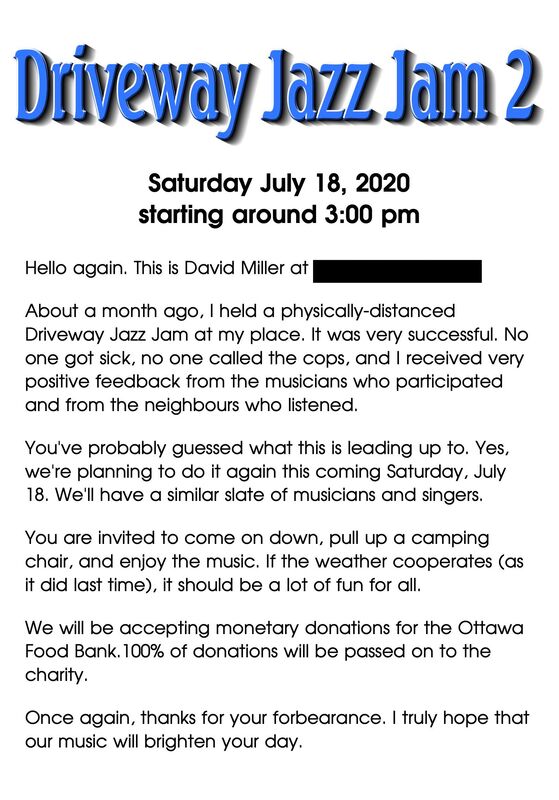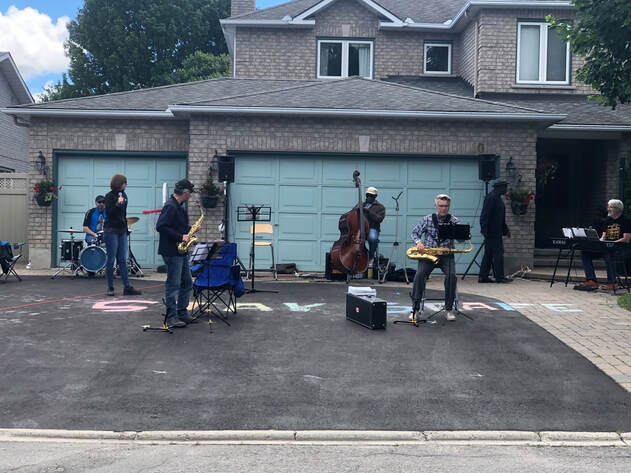Al Fresco Jams and Practices
Author: David R. Miller
[email protected]
Date: August 26, 2020
Disclaimer: The opinions expressed in this article are those of the author and are not necessarily those of Ottawa Jazz Happenings or of JazzWorks Canada.

Al Fresco Jams and Practices
Like many of you, I was a happy amateur musician, playing with a variety of ensembles and gigging regularly, until the pandemic struck. For a time, self-isolation gave me extra time to practise and compose, and I happily availed myself of the opportunity. I also participated in a number of online collaborations, where each musician records his part separately and someone with the proper tools and know-how melds the audio and video together. It wasn’t long, however, before I began to seriously miss playing live with other musicians. After all, one of the main attractions of the jazz genre is improvisation and interaction with others.
Inspired by a suggestion from a friend, I decided to hold a driveway jazz jam at my house. It was a big success in the eyes of both the participants and the spectators who gathered to listen. A few weeks later, I was invited to participate in another driveway jazz jam by another friend, and a couple of weeks after that, I held a second event at my place. In addition, some of the bands I belong to have started al fresco practices, either in garages or on backyard patios.
My purpose is writing this article is to encourage you to hold your own outdoor jams, practices, and concerts and to offer you a list of things to think about, based on my own experience.
Nature of event
Your first step is to decide what kind of event you are holding.
If it’s a jam, there are a few options. Is it private, in that the musicians are playing only for themselves? Note that if it’s on a front driveway, it’s a public event whether you like it or not. If it’s a band practice, then the personnel is already set. But if it’s a jam, is it open or closed? I feel that a closed jam (by invite only) is best, because you as organizer are going to have to manage public distancing and sanitation, meaning that you need to control the participants.
How long will you play? My recommendation is to plan for 2 or 3 hours. If, at the end of that time, everyone is having a great time and no one has collapsed from heat stroke, you can simply keep going.
Venue
A driveway is a great option. But unless your roster is small, you will need a large driveway, at least a 2-car and better a 3-car. Another option is to use two contiguous driveways. Note that most driveways are sloped, usually towards the street but sometimes towards the house. The grade cannot be excessive, since instruments like drums and piano will not tolerate the slope.
Another option is to play in a large empty garage. You will have to keep the main door open, and it’s best to keep another door to the outside open to maintain sufficient ventilation.
A third option is an expansive front porch or back veranda with a roof and open sides. These are rather rare, but you may be lucky enough to have access to one.
Finally, there is the back yard, either a lawn or a patio. Gazebos are generally not big enough to maintain proper distancing.
Planning
An important task is figuring out who and how many to invite. The maximum number will be dictated by the space available in accordance with the 2 meter rule. Wind players, especially brass, should be allocated a little more room, since they tend to be produce spit (fact of life). Start with your rhythm section and then add singers and winds. Think of this as an opportunity to put a band together. Balance your musicians in terms of instruments, ability and style, striving to form a group who will complement each other.
Weather is an important factor. When you are playing outside, particularly in the open, rain and thunderstorms will bring an immediate end to the proceedings. Forecasts can change dramatically over the course of a few days, so plan a rain date from the outset.
In my opinion, it is only fair to let your neighbours know in advance what you are planning, probably with at least two days’ notice. In my case, I put a flyer in the mailbox of every house on our street (about 20 homes). Here’s an example. Invite your neighbours to bring their lawn chairs and enjoy the music. Remind them that they are responsible for their own social distancing. Even if some neighbours are jazz-adverse, you’re less likely to generate a complaint if you let them know ahead of time. Here's my flyer for our second driveway jam.
If you’re thinking of your event as more of a concert and are hoping for a sizeable audience, you can advertise your event further afield. Invite your neighbours to invite their friends and families. Community newsletters are a good bet. You can even post a notice on Facebook or tweet it.
At my first driveway jam, I had several people offer us money, which I refused. In subsequent jams, I accepted donations for the Ottawa Food Bank. One jam raised $420 and the other over $600!
Consider whether you need a PA. You definitely will, of course, if you have vocalists. Depending on the set-up, some horns might benefit from miking — muted brass, for instance. Generally speaking, your rhythm section (piano, guitar, bass, drums) should not need amplification for an event such as this. If your jam is more like a concert, consider having a PA and microphone just to welcome people and to announce the tunes. You audience will appreciate it.
Make a list in advance of some tunes you would like to play. Otherwise, you run the risk of having everything ready to roll and asking “OK, what do we want to play?” followed by an awkward silence punctuated by the flip of fake book pages. If you have vocalists, make sure that you have concert and transposed charts in the singer’s key.
Regarding fake books, make sure you’re playing from the same hymn book. Different editions of the Real books have different keys for some tunes. Some of the musicians may be using tablets for jazz charts. This is fine, but remember two things about tablets in the bright sun: screens must be at full brightness, which severely affects battery life, and, on a hot day, tablets can overheat and shut down. This actually happened at one jam.
Remind musicians to bring a music stand if they want one. Have extra clips on hand for securing sheet music, which often behaves badly in the open air. Clothespins will do in a pinch (pun intended), although you only have them in your home if you’re my age.
Day-of preparations
Our solution to social distancing requirements was to use sidewalk chalk to mark on the driveway where participants were allowed to stand. We actually had some grandkids over, so we let them mark and decorate the designated spots.
You will need electricity (obviously). Run out a couple of extension cords.
Cold water is essential. Have pre-cooled bottles of water ready in a camping cooler kept in the shade. Beer is nice, too, but I recommend you save it for after the event. Another thoughtful idea is to have sweat rags or paper towels available. If it’s a hot day, there will be sweat.
You should set up a sanitation station for the use of participants and audience. It should have a bottle of hand sanitizer and paper towels. Beside it, set up a garbage pail and a recycling bin.
There's a good chance that someone will need to use the washroom. I recommend that you remove all your usual towels and bars of soap. Stock the downstairs washroom instead with paper towels and a soap dispenser. It's probably a good idea to disinfect the room after the event.
If you have opted to collect for a charity or for the musicians, put out a box with appropriate signage, explaining exactly what you are collecting for and what will happen to donations.
You should establish a rain protocol if your event is open to the heavens. For instance, at the first serious drops of rain or the first crack of thunder:
Have some umbrellas at the ready in case of a major downpour.
Conclusion
Thanks for reading this rambling list of suggestions for making your al fresco jazz event a success. Each one that I have participated in has been tons of fun, and I encourage you to pick up the torch. Yet another benefit is that you may learn new things about your neighbours, and they about you.
David R. Miller, piano guy
Like many of you, I was a happy amateur musician, playing with a variety of ensembles and gigging regularly, until the pandemic struck. For a time, self-isolation gave me extra time to practise and compose, and I happily availed myself of the opportunity. I also participated in a number of online collaborations, where each musician records his part separately and someone with the proper tools and know-how melds the audio and video together. It wasn’t long, however, before I began to seriously miss playing live with other musicians. After all, one of the main attractions of the jazz genre is improvisation and interaction with others.
Inspired by a suggestion from a friend, I decided to hold a driveway jazz jam at my house. It was a big success in the eyes of both the participants and the spectators who gathered to listen. A few weeks later, I was invited to participate in another driveway jazz jam by another friend, and a couple of weeks after that, I held a second event at my place. In addition, some of the bands I belong to have started al fresco practices, either in garages or on backyard patios.
My purpose is writing this article is to encourage you to hold your own outdoor jams, practices, and concerts and to offer you a list of things to think about, based on my own experience.
Nature of event
Your first step is to decide what kind of event you are holding.
If it’s a jam, there are a few options. Is it private, in that the musicians are playing only for themselves? Note that if it’s on a front driveway, it’s a public event whether you like it or not. If it’s a band practice, then the personnel is already set. But if it’s a jam, is it open or closed? I feel that a closed jam (by invite only) is best, because you as organizer are going to have to manage public distancing and sanitation, meaning that you need to control the participants.
How long will you play? My recommendation is to plan for 2 or 3 hours. If, at the end of that time, everyone is having a great time and no one has collapsed from heat stroke, you can simply keep going.
Venue
A driveway is a great option. But unless your roster is small, you will need a large driveway, at least a 2-car and better a 3-car. Another option is to use two contiguous driveways. Note that most driveways are sloped, usually towards the street but sometimes towards the house. The grade cannot be excessive, since instruments like drums and piano will not tolerate the slope.
Another option is to play in a large empty garage. You will have to keep the main door open, and it’s best to keep another door to the outside open to maintain sufficient ventilation.
A third option is an expansive front porch or back veranda with a roof and open sides. These are rather rare, but you may be lucky enough to have access to one.
Finally, there is the back yard, either a lawn or a patio. Gazebos are generally not big enough to maintain proper distancing.
Planning
An important task is figuring out who and how many to invite. The maximum number will be dictated by the space available in accordance with the 2 meter rule. Wind players, especially brass, should be allocated a little more room, since they tend to be produce spit (fact of life). Start with your rhythm section and then add singers and winds. Think of this as an opportunity to put a band together. Balance your musicians in terms of instruments, ability and style, striving to form a group who will complement each other.
Weather is an important factor. When you are playing outside, particularly in the open, rain and thunderstorms will bring an immediate end to the proceedings. Forecasts can change dramatically over the course of a few days, so plan a rain date from the outset.
In my opinion, it is only fair to let your neighbours know in advance what you are planning, probably with at least two days’ notice. In my case, I put a flyer in the mailbox of every house on our street (about 20 homes). Here’s an example. Invite your neighbours to bring their lawn chairs and enjoy the music. Remind them that they are responsible for their own social distancing. Even if some neighbours are jazz-adverse, you’re less likely to generate a complaint if you let them know ahead of time. Here's my flyer for our second driveway jam.
If you’re thinking of your event as more of a concert and are hoping for a sizeable audience, you can advertise your event further afield. Invite your neighbours to invite their friends and families. Community newsletters are a good bet. You can even post a notice on Facebook or tweet it.
At my first driveway jam, I had several people offer us money, which I refused. In subsequent jams, I accepted donations for the Ottawa Food Bank. One jam raised $420 and the other over $600!
Consider whether you need a PA. You definitely will, of course, if you have vocalists. Depending on the set-up, some horns might benefit from miking — muted brass, for instance. Generally speaking, your rhythm section (piano, guitar, bass, drums) should not need amplification for an event such as this. If your jam is more like a concert, consider having a PA and microphone just to welcome people and to announce the tunes. You audience will appreciate it.
Make a list in advance of some tunes you would like to play. Otherwise, you run the risk of having everything ready to roll and asking “OK, what do we want to play?” followed by an awkward silence punctuated by the flip of fake book pages. If you have vocalists, make sure that you have concert and transposed charts in the singer’s key.
Regarding fake books, make sure you’re playing from the same hymn book. Different editions of the Real books have different keys for some tunes. Some of the musicians may be using tablets for jazz charts. This is fine, but remember two things about tablets in the bright sun: screens must be at full brightness, which severely affects battery life, and, on a hot day, tablets can overheat and shut down. This actually happened at one jam.
Remind musicians to bring a music stand if they want one. Have extra clips on hand for securing sheet music, which often behaves badly in the open air. Clothespins will do in a pinch (pun intended), although you only have them in your home if you’re my age.
Day-of preparations
Our solution to social distancing requirements was to use sidewalk chalk to mark on the driveway where participants were allowed to stand. We actually had some grandkids over, so we let them mark and decorate the designated spots.
You will need electricity (obviously). Run out a couple of extension cords.
Cold water is essential. Have pre-cooled bottles of water ready in a camping cooler kept in the shade. Beer is nice, too, but I recommend you save it for after the event. Another thoughtful idea is to have sweat rags or paper towels available. If it’s a hot day, there will be sweat.
You should set up a sanitation station for the use of participants and audience. It should have a bottle of hand sanitizer and paper towels. Beside it, set up a garbage pail and a recycling bin.
There's a good chance that someone will need to use the washroom. I recommend that you remove all your usual towels and bars of soap. Stock the downstairs washroom instead with paper towels and a soap dispenser. It's probably a good idea to disinfect the room after the event.
If you have opted to collect for a charity or for the musicians, put out a box with appropriate signage, explaining exactly what you are collecting for and what will happen to donations.
You should establish a rain protocol if your event is open to the heavens. For instance, at the first serious drops of rain or the first crack of thunder:
- shut down all amps
- open the garage door
- move all amps and instruments inside
Have some umbrellas at the ready in case of a major downpour.
Conclusion
Thanks for reading this rambling list of suggestions for making your al fresco jazz event a success. Each one that I have participated in has been tons of fun, and I encourage you to pick up the torch. Yet another benefit is that you may learn new things about your neighbours, and they about you.
David R. Miller, piano guy

